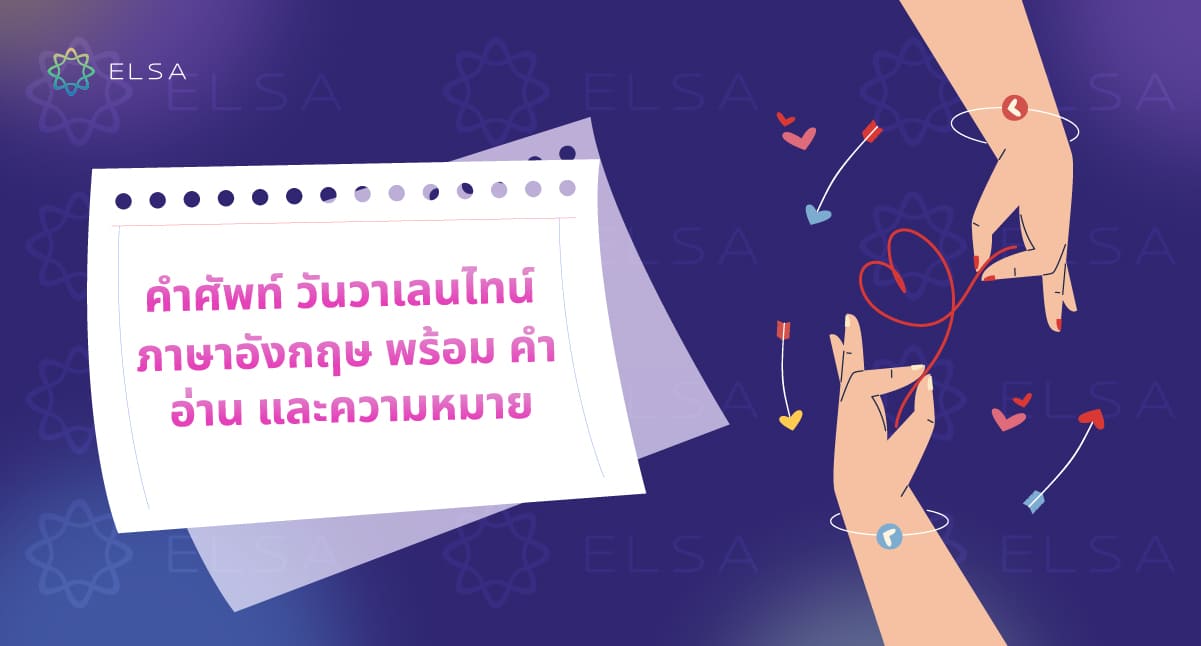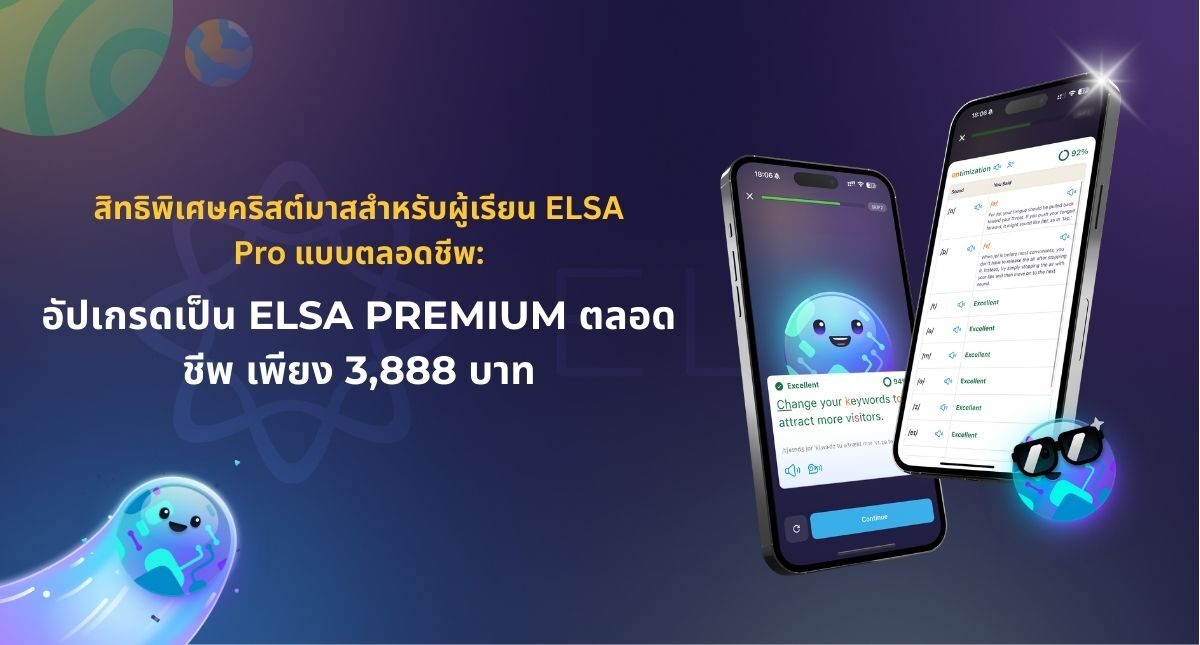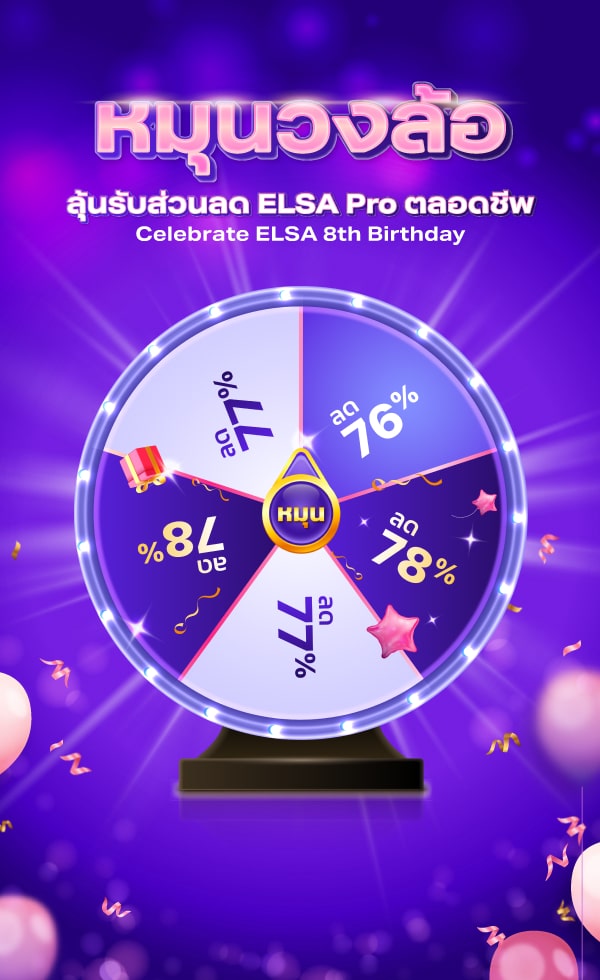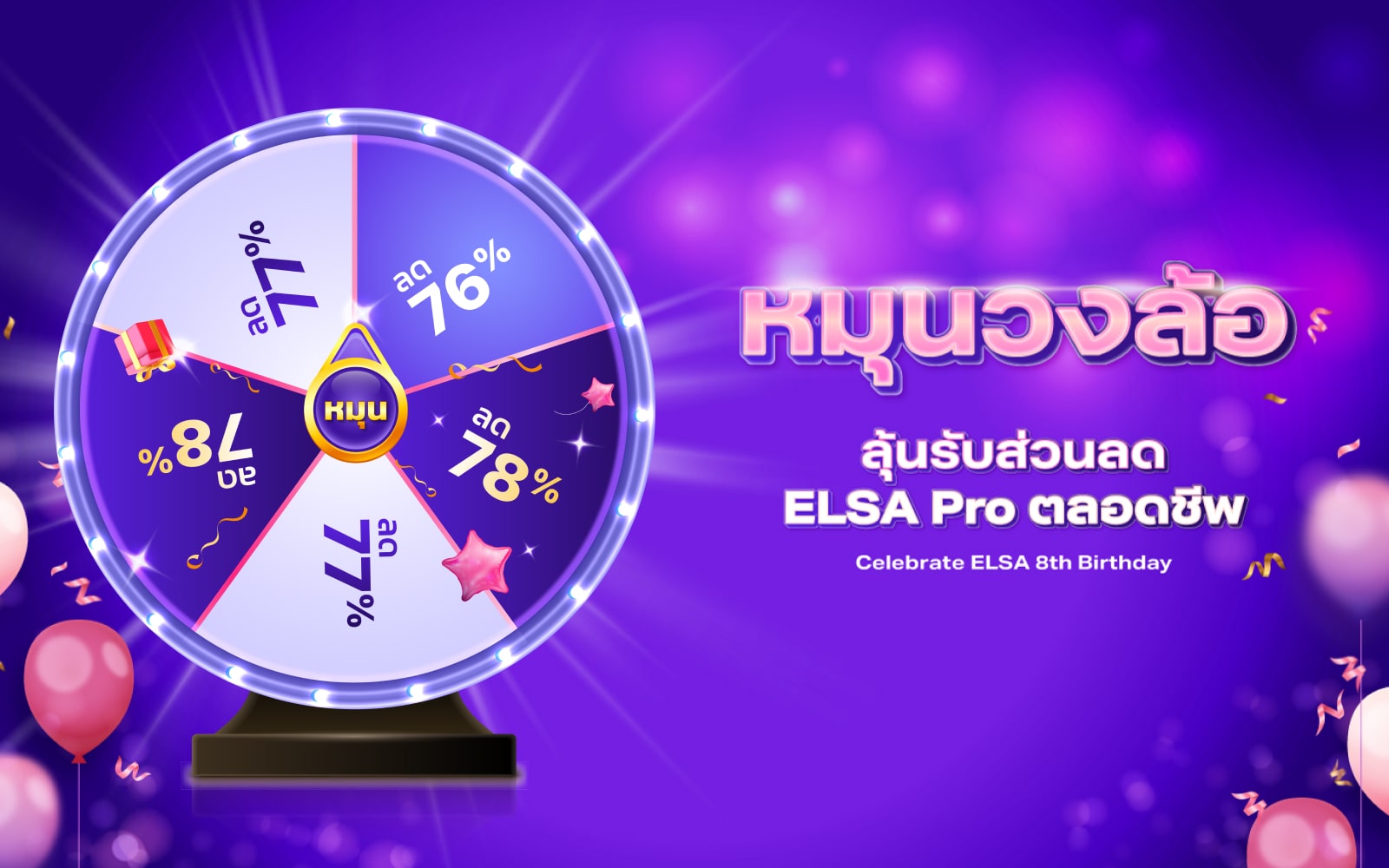คุณเคยสงสัยไหมว่ากิจกรรม ภาษาอังกฤษคืออะไรและจะนำไปใช้ในชีวิตประจำวันได้อย่างไร กิจกรรมภาษาอังกฤษที่น่าสนใจเหล่านี้ไม่เพียงแต่ช่วยให้คุณเพิ่มคลังคำศัพท์ แต่ยังช่วยพัฒนาทักษะการสื่อสารอย่างมีนัยสำคัญอีกด้วย มาสำรวจคำศัพท์และประโยคที่อธิบายถึงกิจกรรมที่น่าสนใจ และเรียนรู้วิธีการเรียนภาษาอังกฤษอย่างมีประสิทธิภาพผ่านบทความด้านล่างนี้กันเถอะ !
กิจกรรม Activity หมายถึงอะไร?
ในภาษาอังกฤษ กิจกรรม แปลว่า Activity (คำนาม ออกเสียงว่า: /ækˈtɪvəti/) กิจกรรม คือ พฤติกรรมที่เกิดขึ้นในชีวิตประจำวันของบุคคลหรือชุมชน
สอบก่อนเข้าฟรี

ความแตกต่างระหว่าง activity และ action:
| คำจำกัดความ | ตัวอย่าง | |
| Activity | สิ่งที่คนหนึ่งหรือกลุ่มคนหนึ่งทำร่วมกัน | Please join this family activity. |
| Action | กระบวนการทำบางสิ่งบางอย่างเพื่อบรรลุเป้าหมาย | We should take action before it’s too late. |

รวม 100 กิจกรรมเป็นภาษาอังกฤษที่ใช้ในชีวิตประจำวัน
คำศัพท์เกี่ยวกับกิจกรรมในโรงเรียนเป็นภาษาอังกฤษ
| คำศัพท์ | การออกเสียง | ความหมาย | ตัวอย่าง |
| Study | /ˈstʌd.i/ | เรียน | She loves to study biology in the library. |
| Read | /riːd/ | อ่าน | He always reads a book before class. |
| Write | /raɪt/ | เขียน | She likes to write poems in her notebook. |
| Learn | /lɜːrn/ | เรียน เรียนรู้ | They are eager to learn new skills. |
| Teach | /tiːtʃ/ | สอน | She loves to teach English to young students. |
| Discuss | /dɪˈskʌs/ | สนทนา อภิปราย | We often discuss ideas in groups. |
| Present | /ˈprez.ənt/ | แนะนำ | He has to present his project tomorrow. |
| Research | /rɪˈsɜːrtʃ/ | วิจัย | They are conducting research on climate change. |
| Participate | /pɑːrˈtɪs.ɪ.peɪt/ | มีส่วนร่วม เข้าร่วม ร่วมมือ | Students are encouraged to participate in clubs. |
| Practice | /ˈpræk.tɪs/ | ฝึกฝน | You need to practice speaking every day. |
| Experiment | /ɪkˈsper.ɪ.mənt/ | ทดลอง ทดสอบ, พิสูจน์ | We will experiment with different chemicals. |
| Revise | /rɪˈvaɪz/ | ทบทวน แก้ไข | She needs to revise for the final exam. |
| Memorize | /ˈmem.ə.raɪz/ | จำ จดจำ | It’s hard to memorize all the formulas. |
| Debate | /dɪˈbeɪt/ | โต้วาที | They had a heated debate about the topic. |
| Perform | /pəˈfɔːrm/ | แสดง | The students will perform a play at the event. |
| Collaborate | /kəˈlæb.ə.reɪt/ | ร่วมมือ | They will collaborate on a science project. |
| Solve | /sɒlv/ | แก้ปัญหา | We need to solve this math problem together. |
| Brainstorm | /ˈbreɪn.stɔːrm/ | ระดมความคิด | The team will brainstorm ideas for the project. |
| Draw | /drɔː/ | วาดภาพ ลาก ดึง | She loves to draw pictures during art class. |
| Sing | /sɪŋ/ | ร้องเพลง | They will sing the school anthem in assembly. |
| Dance | /dæns/ | เต้นรำ | We often dance during music lessons. |
| Plan | /plæn/ | วางแผน | She will plan the schedule for the event. |
| Solve | /sɒlv/ | Giải quyết | We need to solve this math problem together. |
| Listen | /ˈlɪs.ən/ | ฟัง | Please listen carefully to the instructions. |
| Explore | /ɪkˈsplɔːr/ | ตรวจ สำรวจ | They love to explore new subjects in school. |
| Ask | /æsk/ | ถาม | Don’t hesitate to ask questions in class. |
| Answer | /ˈæn.sər/ | ตอบ | Please answer all the questions in the quiz. |
| Organize | /ˈɔːr.ɡə.naɪz/ | จัดตั้ง | They will organize a charity event next week. |
| Lead | /liːd/ | นำ | She was chosen to lead the debate team. |
| Observe | /əbˈzɜːv/ | สังเกต | We will observe the stars during the night. |
| Recite | /rɪˈsaɪt/ | ท่อง ท่องจำ | She can recite the poem perfectly. |
| Guide | /ɡaɪd/ | นำทาง | The teacher will guide us through the process. |
| Experiment | /ɪkˈsper.ɪ.mənt/ | การทดลอง | We will experiment with different chemicals. |
| Share | /ʃeər/ | แบ่งปัน | Please share your findings with the class. |
| Test | /test/ | ทดสอบ | We will have a history test tomorrow. |
| Build | /bɪld/ | สร้าง | The team will build a model for the competition. |
| Evaluate | /ɪˈvæl.ju.eɪt/ | ประเมินผล ประเมินค่า | They will evaluate the results of the survey. |
| Explain | /ɪkˈspleɪn/ | อธิบาย | Can you explain this concept to me? |
| Prepare | /prɪˈpeər/ | จัดเตรียม ตระเตรียม | She is preparing for the science fair. |
| Schedule | /ˈskedʒ.uːl/ | ทำตารางเวลา ทำกำหนดการ | We will schedule the event for next Friday. |
| Record | /rɪˈkɔːrd/ | บันทึก | We will record the lecture for later review. |
| Collect | /kəˈlekt/ | เก็บรวม รวบรวม | Please collect data from your classmates. |
| Analyze | /ˈæn.əl.aɪz/ | วิเคราะห์ | We need to analyze the survey results. |
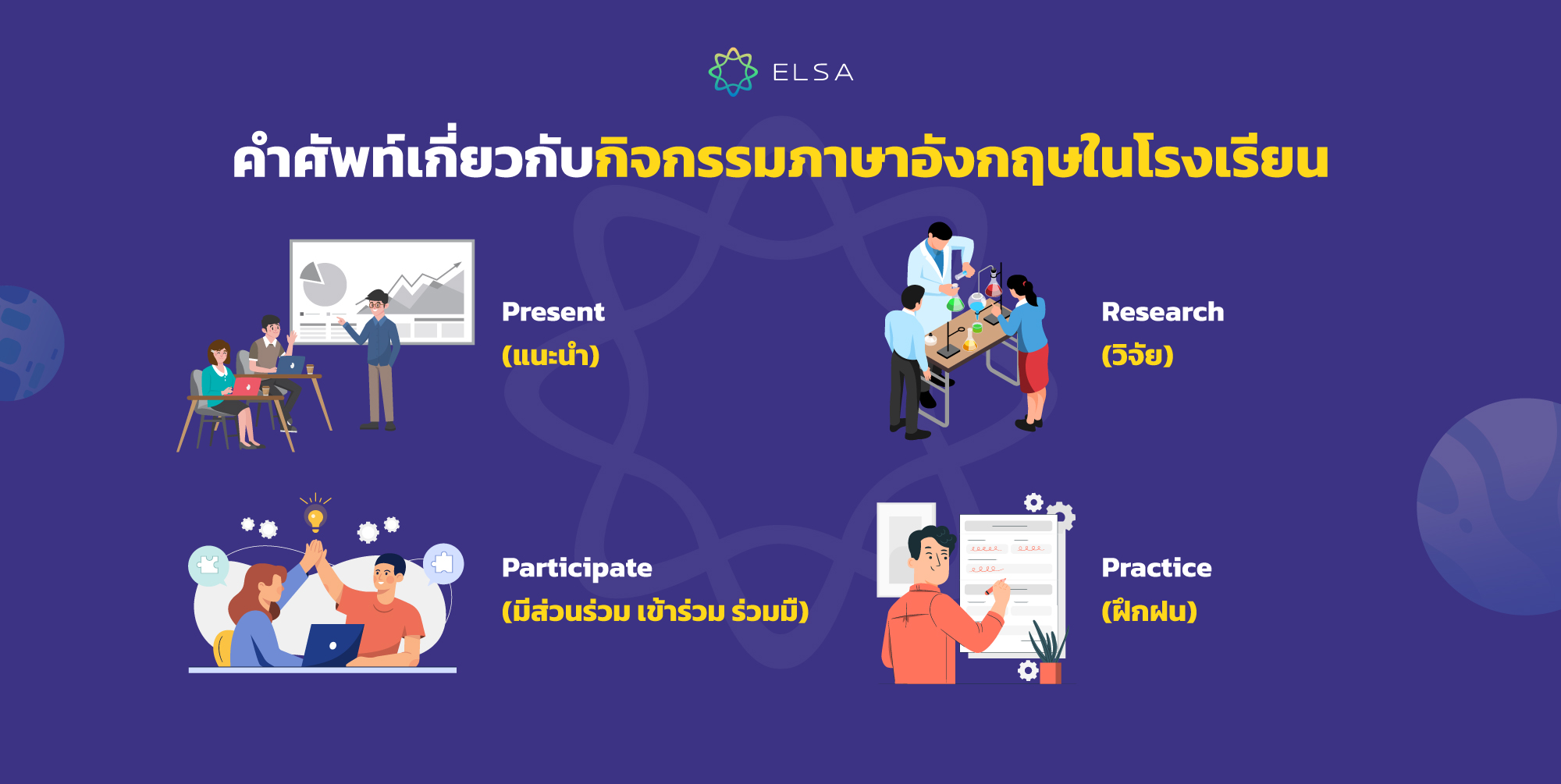
คำศัพท์ภาษาอังกฤษเกี่ยวกับกิจกรรม ภาษาอังกฤษ นอก ห้องเรียน
| คำศัพท์ | การออกเสียง | ความหมาย | ตัวอย่าง |
| Go for a walk | /ɡoʊ fɔːr ə wɔk/ | ไปเดินเล่น | I like to go for a walk in the park. |
| Play outside | /pleɪ aʊtsaɪd/ | ออกไปเล่นข้างนอก | Children love to play outside. |
| Go cycling | /ɡoʊ ˈsaɪ.klɪŋ/ | ขี่จักรยาน | We go cycling every Saturday. |
| Go for a run | /ɡoʊ fɔːr ə rʌn/ | ไปวิ่ง | I go for a run in the morning. |
| Visit the beach | /ˈvɪzɪt ðə biːtʃ/ | ไปเที่ยวทะเล | We visit the beach in summer. |
| Go hiking | /ɡoʊ ˈhaɪ.kɪŋ/ | ไปเดินเขา | They go hiking on weekends. |
| Have a picnic | /hæv ə ˈpɪk.nɪk/ | การไปเที่ยวนอกบ้านและนำอาหารไปรับประทาน ปิกนิก | We have a picnic in the park. |
| Play sports | /pleɪ spɔːrts/ | เล่นกีฬา | He plays sports every afternoon. |
| Go fishing | /ɡoʊ ˈfɪʃ.ɪŋ/ | ไปตกปลา | They go fishing by the river. |
| Go camping | /ɡoʊ ˈkæm.pɪŋ/ | ไปตั้งแคมป์ | We go camping in the mountains. |
| Play football | /pleɪ ˈfʊtbɔːl/ | เล่นฟุตบอล | They play football every weekend. |
| Go to the cinema | /ɡoʊ tuː ðə ˈsɪnəmə/ | ดูหนัง/ภาพยนตร์ | I go to the cinema once a month. |
| Go shopping | /ɡoʊ ˈʃɑːpɪŋ/ | ไปช้อปปิ้ง | She goes shopping every Friday. |
| Go to a concert | /ɡoʊ tuː ə ˈkɒn.sɜːrt/ | ไปดูคอนเสิร์ต | We go to a concert every summer. |
| Take photos | /teɪk ˈfoʊtoʊz/ | ถ่ายภาพ | I like to take photos of nature. |
| Go to the zoo | /ɡoʊ tuː ðə zuː/ | ไปเที่ยวสวนสัตว์ | We go to the zoo on weekends. |
| Attend a festival | /əˈtɛnd ə ˈfɛstəvəl/ | เข้าร่วมงานเทศกาล | They attend a festival every year. |
| Go bowling | /ɡoʊ ˈboʊ.lɪŋ/ | ไปเล่นโบว์ลิ่ง | We go bowling for fun. |
| Go skiing | /ɡoʊ ˈskiː.ɪŋ/ | ไปเล่นสกี | I go skiing in the winter. |
| Go to a play | /ɡoʊ tuː ə pleɪ/ | ไปโรงละคร | We go to a play every spring. |
| Play board games | /pleɪ bɔːrd ɡeɪmz/ | การเล่นบอร์ดเกม | We love to play board games during family time. |
| Bake cookies | /beɪk ˈkʊkiz/ | อบคุกกี้ | She likes to bake cookies on weekends. |
| Paint pictures | /peɪnt ˈpɪk.tʃərz/ | วาดภาพ | He enjoys painting pictures in his free time. |
| Write a diary | /raɪt ə ˈdaɪəri/ | เขียนไดอารี่ | She writes a diary every evening. |
| Visit a museum | /ˈvɪzɪt ə mjuˈziəm/ | ไปเยี่ยมชมพิพิธภัณฑ์ | We often visit a museum to learn about history. |
| Do gardening | /du ˈɡɑːr.dənɪŋ/ | ทำสวน | They enjoy doing gardening on sunny days. |
| Practice yoga | /ˈpræk.tɪs ˈjoʊɡə/ | เล่นโยคะ | She practices yoga to relax her mind. |
| Meditate | /ˈmed.ɪ.teɪt/ | ทำสมาธิ | He likes to meditate in the morning. |
| Build a model | /bɪld ə ˈmɒd.əl/ | สร้างแบบจำลอง | He loves to build models of airplanes. |
| Play an instrument | /pleɪ ən ˈɪn.strə.mənt/ | เล่นเครื่องดนตรี | She is learning to play an instrument like the guitar. |
| Ride a horse | /raɪd ə hɔːrs/ | ขี่ม้า | They often ride horses on the farm. |
| Do puzzles | /du ˈpʌz.əlz/ | เล่นเกมปริศนา | I like to do puzzles in my free time. |
| Make crafts | /meɪk kræfts/ | ทำหัตถกรรม | She loves to make crafts out of recycled materials. |
| Attend a workshop | /əˈtend ə ˈwɜːrkʃɒp/ | เข้าร่วมเวิร์กช็อป | He plans to attend a workshop on photography. |
| Try a new recipe | /traɪ ə nju ˈrɛsɪpi/ | ลองสูตรใหม่ | She enjoys trying new recipes in the kitchen. |
| Do origami | /du ˌɒrɪˈɡɑːmi/ | ทำโอริกามิ พับกระดาษแบบญี่ปุ่น | She enjoys doing origami as a hobby. |
| Attend a book club | /əˈtend ə bʊk klʌb/ | เข้าร่วมชมรมหนังสือ | He recently attended a book club in the community. |
>>>Read more: รวมเกมภาษาอังกฤษที่ดีและมีประโยชน์ 41 เกมเพื่อเรียนไปด้วยเล่นไปด้วย
คำศัพท์ภาษาอังกฤษเกี่ยวกับกิจกรรมในชีวิตประจำวัน
| คำศัพท์ | การออกเสียง | ความหมาย | ตัวอย่าง |
| Wake up | /weɪk ʌp/ | ตื่น | I wake up at 7 a.m. |
| Get out of bed | /ɡɛt aʊt ʌv bɛd/ | ลุกออกจากเตียง | I get out of bed right away. |
| Brush teeth | /brʌʃ tiːθ/ | แปรงฟัน | Don’t forget to brush your teeth. |
| Make breakfast | /meɪk ˈbrɛk.fɑːst/ | ทำอาหารเช้า | I make breakfast for my family. |
| Pack lunch | /pæk lʌntʃ/ | เตรียมอาหารกลางวัน | I pack lunch before school. |
| Get dressed | /ɡet drest/ | แต่งตัว | I get dressed quickly. |
| Have breakfast | /hæv ˈbrekfəst/ | กินอาหารเช้า | We have breakfast together. |
| Do homework | /du ˈhoʊmwɜrk/ | ทำการบ้าน | I do my homework after dinner. |
| Clean the house | /kliːn ðə haʊs/ | ทำความสะอาดบ้าน | I clean the house on weekends. |
| Cook dinner | /kʊk ˈdɪnər/ | ทำอาหารเย็น | I cook dinner every night. |
| Wash the dishes | /wɔʃ ðə dɪʃɪz/ | ล้างจาน | I wash the dishes after eating. |
| Read a book | /riːd ə bʊk/ | อ่านหนังสือ | I read a book before bed. |
| Watch TV | /wɑtʃ ˈtiːˌviː/ | ดูทีวี | We watch TV in the evening. |
| Feed the cat | /fiːd ðə kæt/ | เลี้ยงอาหารแมว | I feed the cat every morning. |
| Sleep | /sliːp/ | นอน | I sleep for eight hours. |
| Relax | /rɪˈlæks/ | ผ่อนคลาย พักผ่อน | I relax by listening to music. |
| Do laundry | /du ˈlɔːndri/ | ซักผ้า | I do laundry on Sundays. |
| Make the bed | /meɪk ðə bɛd/ | เก็บที่นอน | I make the bed every morning. |
| Take a shower | /teɪk ə ˈʃaʊər/ | อาบน้ำ | I take a shower after exercising. |
| Drink | /drɪŋk/ | ดื่ม | I drink water throughout the day. |
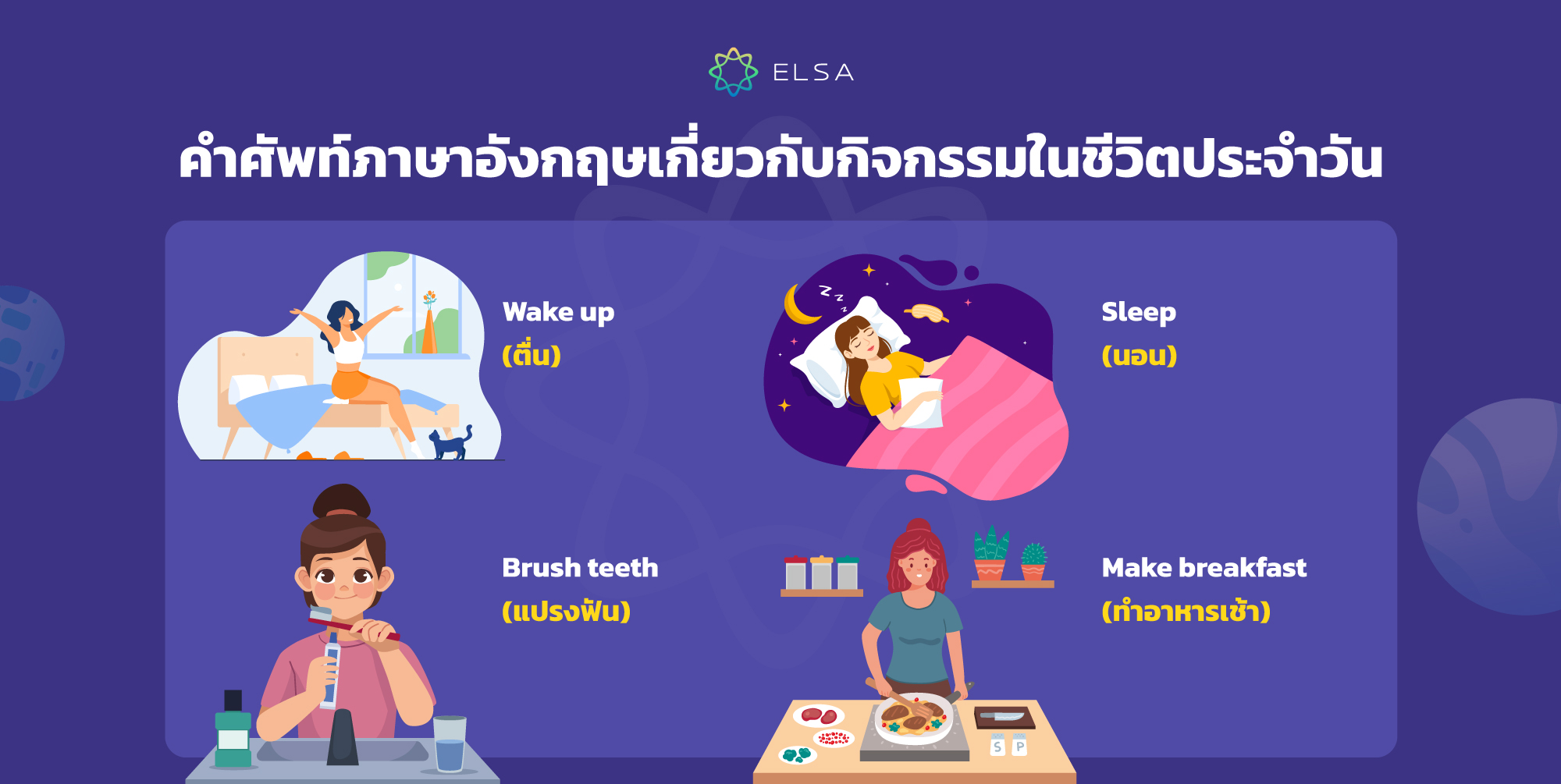
ประโยคสื่อสารทั่วไปเกี่ยวกับกิจกรรมประจำวันในภาษาอังกฤษ
ประโยคเกี่ยวกับกิจกรรมประจำวันในภาษาอังกฤษ
| โครงสร้าง | ความหมาย | ตัวอย่าง |
| I spend a lot of time + V-ing/on N | ฉัน/ผมใช้เวลามากเกินไปเพื่อ… | I spend a lot of time watching movies. |
| I (often) tend to… + V | ทำด้วยความเอาใจใส่… | I often tend to wake up late on weekends. |
| You will always find me + V-ing | คุณจะเจอฉัน/ผม…เสมอ | You will always find me reading a book before bed. |
| V-ing is a big part of my life | … เป็นส่วนสำคัญในชีวิตฉัน/ผม | Exercising is a big part of my life. |
| I make a point of + Noun/V-ing | ฉัน/ผมตั้งเป้าที่จะ… | I make a point of eating a healthy breakfast every day. |
| Whenever I get the chance, I will + V | เมื่อมีโอกาสฉัน/ผมจะ… | Whenever I get the chance, I will travel to new places. |
| I have a habit of… + Noun/V-ing | ฉัน/ผมมีนิสัย… | I have a habit of biting my nails when I’m nervous. |
| I rarely… | ฉัน/ผมไม่ค่อย… | I rarely eat fast food. |
| I enjoy… + V-ing | ฉัน/ผมชอบ… | I enjoy listening to music. |
| I’m not a fan of… + V-ing | ฉัน/ผมไม่ชอบ… | I’m not a fan of getting up early. |
| I’m used to… + V-ing | ฉัน/ผมคุ้นเคยกับการ… | I’m used to living in a big city. |
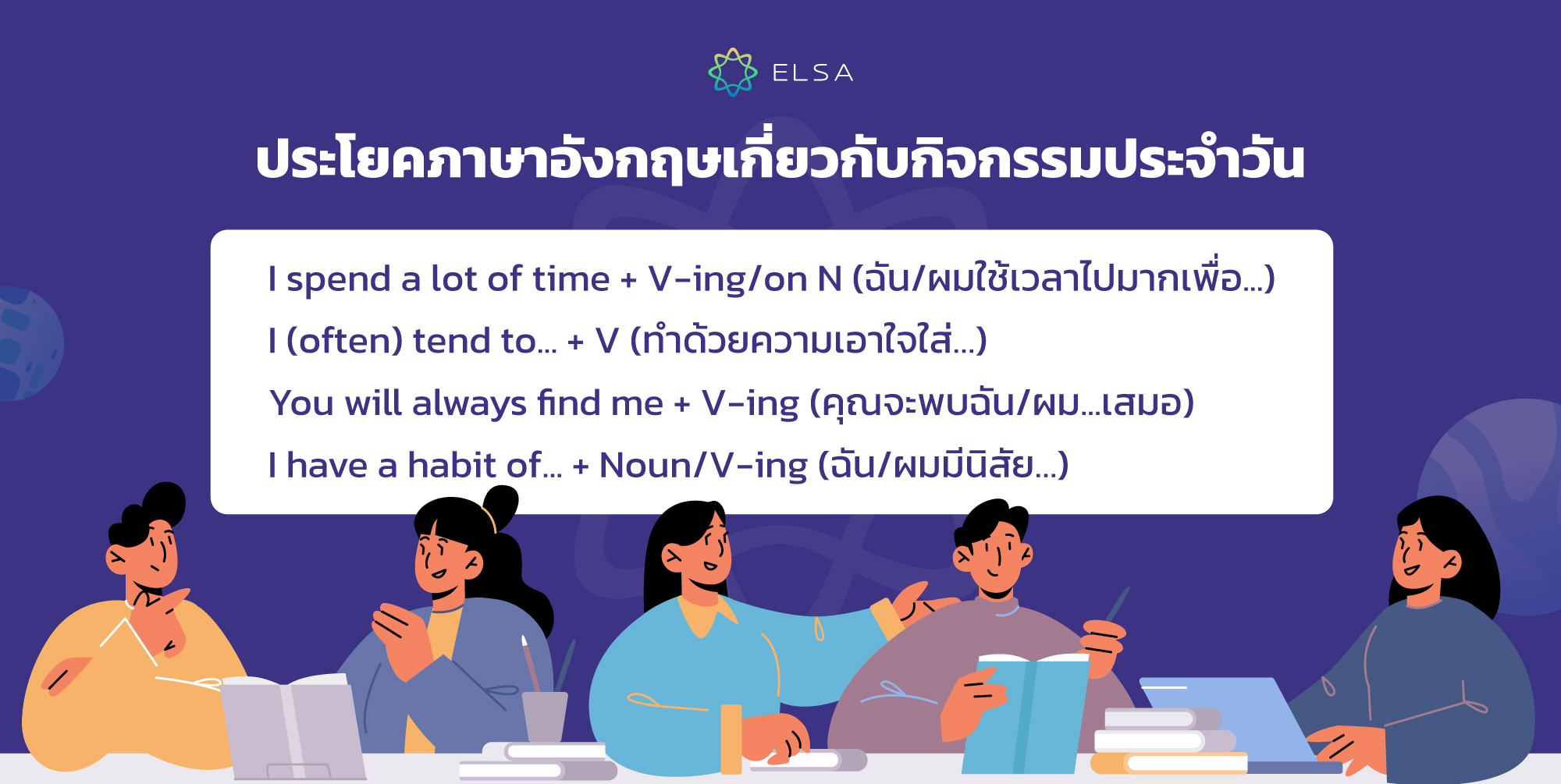
ประโยคคำถาม
| ประโยค | ความหมาย |
| What did you get up to today? | วันนี้คุณทำอะไรมาบ้าง? |
| Did you go to work/school today? | วันนี้คุณไปทำงาน/เรียนไหม? |
| Did you work out today? | วันนี้คุณออกกำลังกายแล้วหรือยัง? |
| What did you learn today? | วันนี้คุณได้เรียนรู้อะไรมาบ้าง? |
| What interesting things happened today? | วันนี้มีเรื่องอะไร น่าสนใจเกิดขึ้นบ้าง? |
| What time do you usually wake up? | คุณมักจะตื่นกี่โมง? |
| How do you usually spend your weekends? | คุณมักจะใช้เวลาช่วงวันหยุดสุดสัปดาห์ทำอะไร? |
| What do you like to do in your free time? | คุณชอบทำอะไรในเวลาว่าง? |
| Do you prefer to study in the morning or evening? | คุณชอบเรียนในตอนเช้าหรือตอนเย็น? |
| How often do you watch TV? | ปกติแล้วคุณดูทีวีบ่อยแค่ไหน? |
| What is your favorite sport? | กีฬาโปรดของคุณคืออะไร? |
| Do you play any musical instruments? | คุณเล่นเครื่องดนตรีบ้างไหม? |
| What activities do you enjoy after school? | คุณชอบทำกิจกรรมอะไรนอกห้องเรียน? |
| How do you stay active? | คุณรักษาสุขภาพให้แข็งแรงได้อย่างไร? |
| What is a typical day like for you? | ปกติแล้วในแต่ละวันของการทำงานของคุณเป็นยังไง |
| Do you have any hobbies? | คุณมีงานอดิเรกอะไรบ้าง? |
| What is your favorite book? | หนังสือโปรดของคุณคืออะไร? |
| How often do you go shopping? | คุณไปช้อปปิ้งบ่อยแค่ไหน? |
| What do you usually have for breakfast? | คุณมักจะทานอะไรเป็นอาหารเช้า? |
| What do you do to relax? | คุณทำอะไรเพื่อให้คุณผ่อนคลาย? |
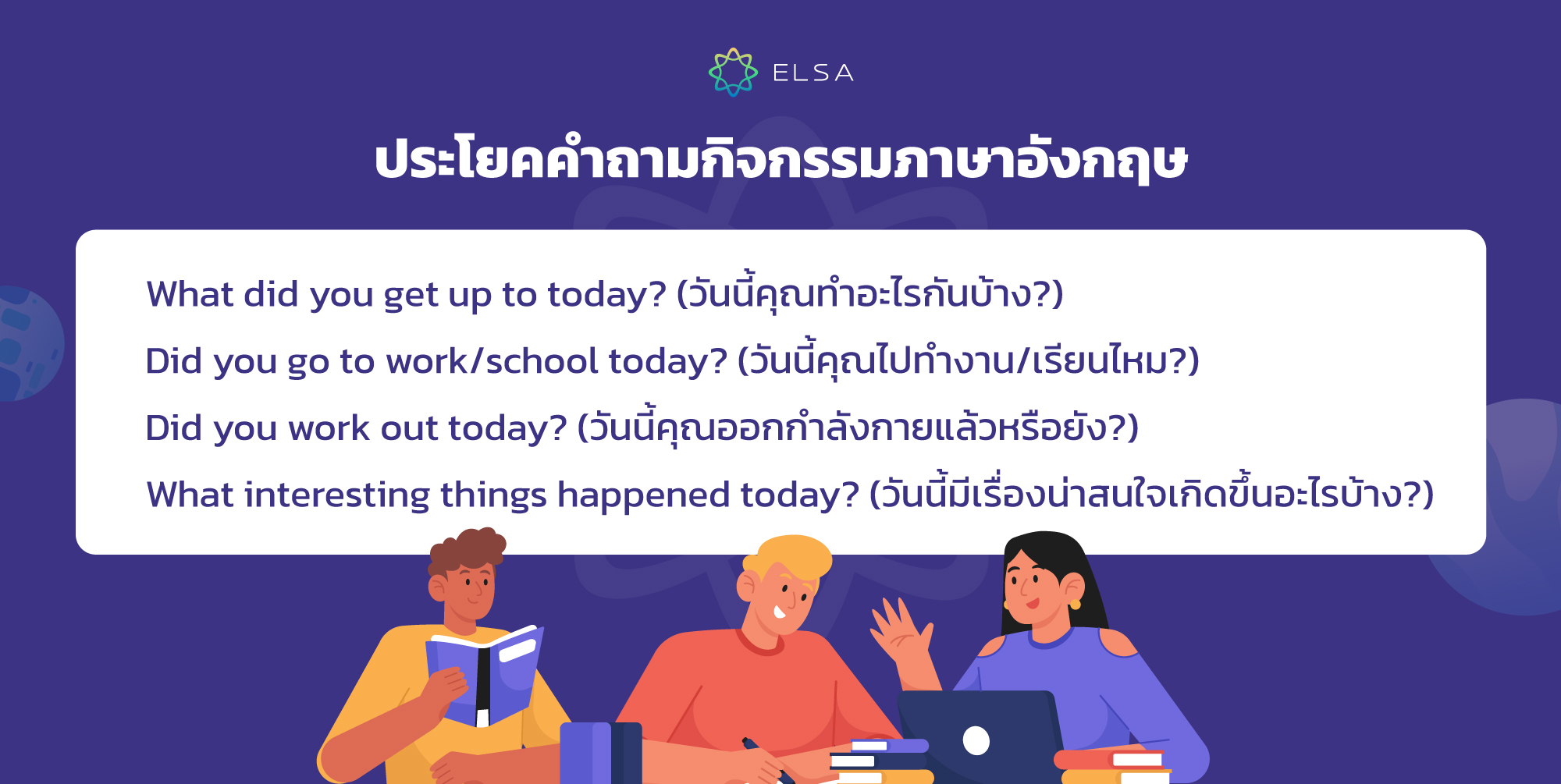
ประโยคสำหรับการตอบและอธิบาย
| ประโยค | ความหมาย |
| I usually wake up at 6:00 AM. | ฉันมักจะตื่นนอนเวลา 6.00 น. |
| I brush my teeth and wash my face. | ฉันแปรงฟันและล้างหน้า |
| I have breakfast at 7:00 AM. | ฉันทานอาหารเช้าตอน 7.00น. |
| I go to school by bus. | ฉันไปโรงเรียนโดยรถประจำทาง |
| I study in the afternoon. | ฉันเรียนหนังสือตอนบ่าย |
| I play soccer with my friends. | ฉันเล่นฟุตบอลกับเพื่อนๆ |
| I cook dinner for my family. | ฉันทำอาหารเย็นให้ครอบครัวของฉัน |
| I usually read a book before bed. | ฉันมักจะอ่านหนังสือก่อนนอน |
| I watch TV for an hour every evening. | ฉันดูทีวีหนึ่งชั่วโมงทุกเย็น |
| I enjoy listening to music while studying. | ฉันชอบฟังเพลงขณะเรียนหนังสือ |
| I take a shower in the evening. | ฉันอาบน้ำตอนเย็น |
| I go for a walk in the park. | ฉันไปเดินเล่นในสวนสาธารณะ |
| I like to draw and paint in my free time. | ฉันชอบวาดรูปและระบายสีในเวลาว่าง |
| I help my parents with housework on weekends. | ฉันช่วยพ่อแม่ทำงานบ้านในช่วงวันหยุดสุดสัปดาห์ |
| I usually have lunch at 12:00 PM. | ฉันมักจะกินข้าวเที่ยงตอน 12.00 น. |
| I often go shopping with my friends. | ฉันมักจจะไปช้อปปิ้งกับเพื่อนบ่อยๆ |
| I practice playing the piano every day. | ฉันฝึกเล่นเปียโนทุกวัน |
| I like to spend time outdoors during summer. | ฉันสนุกกับการใช้เวลาอยู่ข้างนอกในช่วงฤดูร้อน |
| I relax by watching movies on weekends. | ฉันผ่อนคลายด้วยการดูหนังในช่วงวันหยุดสุดสัปดาห์ |
| I usually go to bed around 10:00 PM. | ฉันมักจะเข้านอนประมาณ 22.00 น. |
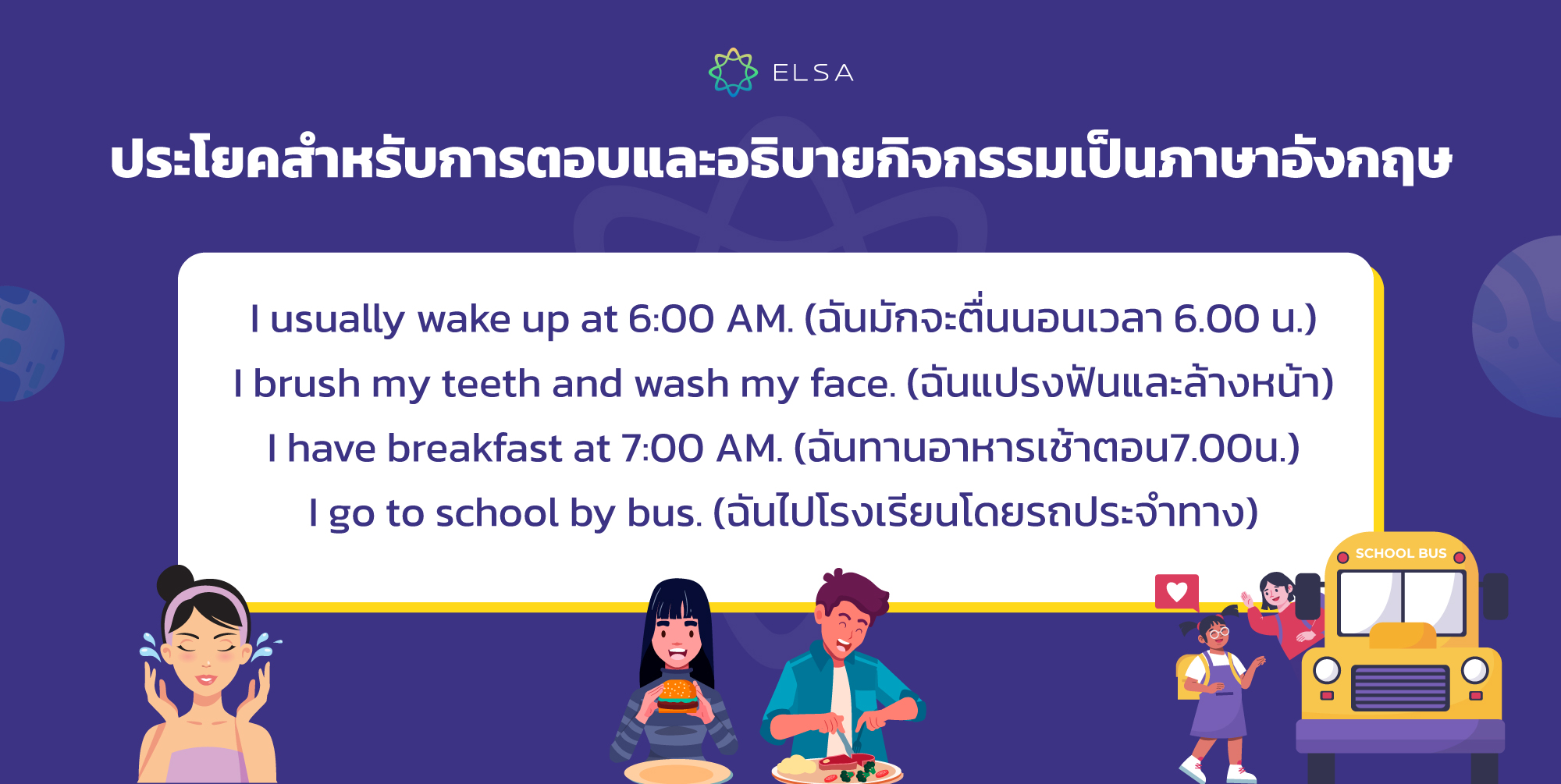
>>>Read more: 100+ แคปชั่น relax time ในภาษาอังกฤษพร้อมความหมายที่ดีที่สุด
กิจกรรมภาษาอังกฤษพาเพลินสำหรับการเรียนรู้พร้อมการเล่น ช่วยพัฒนาทักษะภาษาอังกฤษ
เชื่อมคำ
วิธีการเล่น: สามารถเล่นได้ 1 คน หรือหลายคนก็ได้ เกมเริ่มต้นด้วยการพูดคำศัพท์ คำถัดไปจะต้องใช้ตัวอักษรสุดท้ายของคำก่อนหน้าเพื่อสร้างคำใหม่ แต่ละคำไม่สามารถซ้ำกันได้และจะต้องขึ้นต้นด้วยตัวอักษรสุดท้ายของคำก่อนหน้า
ตัวอย่าง:
คำแรก Cat (ลงท้ายด้วยตัว T)
คำถัดไปอาจจะเป็น Tivi (ขึ้นต้นด้วยตัว T).
กิจกรรมนี้ช่วยปรับปรุงการจดจำคำศัพท์และพัฒนาความคิดทางภาษาได้อย่างยืดหยุ่น ไม่เพียงเท่านั้นหากเล่นกันหลายๆ คน เช่น เพื่อนๆ ในชั้นเรียน กิจกรรมนี้จะสร้างบรรยากาศสนุกสนานและการแข่งขันในห้องเรียนอีกด้วย ซึ่งจะส่งเสริมการมีส่วนร่วมของนักเรียนทุกคน

ตีแมลงวัน
วิธีการเล่น:
กิจกรรมนี้สามารถเล่นในห้องเรียนได้ให้ครูเขียนคำศัพท์ที่เรียนมาหรือติดบัตรคำศัพท์ไว้บนกระดาน และแบ่งนักเรียนเป็น 2 กลุ่ม เมื่อครูออกเสียงคำศัพท์ หรือวลี นักเรียนจะต้องวิ่งไปตีคำที่ตรงกันด้วยไม้บรรทัดหรือหนังสือ กลุ่มที่ตีคำได้มากที่สุดและเร็วที่สุดจะเป็นผู้ชนะ
กิจกรรมนี้สร้างบรรยากาศสนุกสนานและกระตุ้นให้เกิดการแข่งขันระหว่างนักเรียน ช่วยให้นักเรียนจดจำคำศัพท์ได้อย่างเป็นธรรมชาติและสนุกสนาน
ทายคำจากภาพ
วิธีการเล่น:
ให้ครูเตรียมภาพประกอบคำศัพท์หรือวลี จากนั้นให้นักเรียนดูภาพและพยายามเดาคำศัพท์หรือวลีที่สอดคล้องกัน จากนั้นนักเรียนสามารถพูดคุยถึงความหมายหรือการใช้คำนั้นได้
กิจกรรมนี้ช่วยให้นักเรียนพัฒนาทักษะการคิดสร้างสรรค์และความสามารถในการอธิบายความคิดเป็นภาษาอังกฤษ
คำถามที่พบบ่อย
คำคุณศัพท์ของ activity คืออะไร?
คำคุณศัพท์ของ activity เป็น active คำนี้หมายถึง กระตือรือร้น คล่องแคล่ว และมักใช้เพื่ออธิบายกิจกรรมหรือสถานะที่เกี่ยวข้องกับการเคลื่อนไหวและการมีส่วนร่วม
กิจกรรม English Camp มีอะไรบ้าง?
กิจกรรม English Camp รวมถึง:
| กิจกรรม | การออกเสียง | ความหมาย |
| Camping | /ˈkæmpɪŋ/ | ตั้งแคมป์ |
| Hiking | /ˈhaɪkɪŋ/ | เดินเขา |
| Fishing | /ˈfɪʃɪŋ/ | จับปลา |
| Canoeing | /kəˈnuːɪŋ/ | พายเรือเล่น |
| Barbecue | /ˈbɑːrbɪkjuː/ | การทำบาร์บีคิว |
| Stargazing | /ˈstɑːrˌɡeɪzɪŋ/ | การดูดาว |

Activities เป็นคำประเภทไหน?
Activities เป็นคำนามพหูพจน์ หมายถึง การกระทำหรือกิจกรรมที่ผู้คนทำ คำนี้มักใช้ในการบรรยายกิจกรรมในด้านการศึกษา นันทนาการ กีฬา และอื่นๆ อีกมากมาย
Activity อ่านว่าอย่างไรในภาษาอังกฤษ?
การออกเสียงของ Activity คือ /ækˈtɪvɪti/. คุณสามารถฝึกฝนโดยแยกแต่ละส่วนและรวมเข้าด้วยกันเพื่อออกเสียงได้คล่องยิ่งขึ้น จำไว้ว่าจะเน้นที่เสียง “tɪv” ดังนั้นจึงต้องเน้นส่วนนี้มากกว่าเสียงอื่นๆ

การเรียนรู้คำศัพท์และปฏิบัติกิจกรรม ภาษาอังกฤษไม่เพียงแต่ช่วยให้สื่อสารได้ดีขึ้นเท่านั้น แต่ยังนำประสบการณ์ที่น่าสนใจมากมายมาสู่กระบวนการเรียนรู้อีกด้วย หากต้องการปรับปรุงทักษะการออกเสียงและการสื่อสารของคุณอย่างเป็นระบบ คุณสามารถเข้ามาที่แอปพลิเคชัน ELSA Speak ซึ่งเป็นเครื่องมือสนับสนุนการเรียนรู้ภาษาอังกฤษอย่างอัจฉริยะ ช่วยให้คุณฝึกการออกเสียงตามมาตรฐาน และมีความมั่นใจมากขึ้นในการสนทนา

